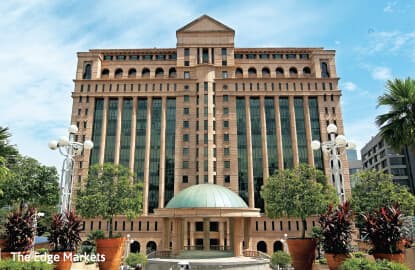
THE unfavourable economic climate and other factors, such as the rising number of Malaysian companies seeking listing abroad, have hit Bursa Malaysia’s initial public offering (IPO) activities hard.
Some RM596.6 million was raised from IPOs this year — which is barely 14% of the sum raised in 2015. According to Bursa, the companies had raised RM4.35 billion in 2015 and RM3.94 billion in 2014 through IPOs.
The number of IPOs this year is the same as last year at 11 — the lowest since 1989, when there were 13 IPOs. There was only six IPOs in 1988.
The absence of mega IPOs, such as from government-linked corporations (GLC), is a key contributing factor to the sharp decline in the proceeds raised via IPOs. The record year for IPO was 2012 when RM22.94 billion was raised from the listing of Felda Global Ventures Holdings Bhd, IHH Healthcare Bhd and Astro Malaysia Holdings Bhd. IHH was the world third largest IPO in 2012.
After the sharp drop of 64.21% year on year in 2013, proceeds raised through IPOs continued to fall in the last three years.
This year, four companies were listed on the ACE Market, and four on the main market. According to Bursa, there will be two more listings, namely Rhone Ma Holdings Bhd and Foundpac Group Bhd, on the Main Market before the year ends.
Rhone Ma is expected to make its debut on Dec 19. The animal health solutions provider has raised about RM31.59 million. The IPO, which offers 42.12 million shares of 50 sen each, was over-subscribed 22.46 times.
Foundpac Group Bhd, a semiconductor manufacturer scheduled to be listed on Dec 29, is offering 40 million shares at 54 sen apiece, which will raise about RM21.6 million.
The IPO activities, however, were in line with regional performance, according to industry observers.
“This year was one of the slowest for IPOs. The market was slowing down across the whole region. There were not many activities because the overall market [sentiment] has been volatile. A lot of industries are risk off. It is really not easy,” CIMB’s private banking head Carolyn Leng tells The Edge.
“There were fewer IPOs this year than in the previous years. This could be attributed to the generally weaker investor sentiment on the local bourse, which resulted in some companies opting to defer their listings to next year.
“Regionally, we are also seeing fewer IPO deals than in 2015,” RHB Investment Bank Bhd’s equity capital markets director and regional head, Gan Kim Khoon, tells The Edge in an email, adding that these IPOs were mainly lacklustre, except for a few.
For instance, Eco World International Bhd, which planned to list this year, has to delay it to next year.
According to the EY Global IPO Trends report, the economic slowdown, especially in China, continues to affect Asean business confidence and GDP growth, which is acting as a brake on IPOs.
The slowdown is exacerbated by ongoing commodity price fluctuations and political developments. For instance, on the Philippine Stock Exchange, there were no IPOs in the third quarter of this year.
The uncertainty of the ringgit and the “Trump” effect may continue to suppress the IPOs in the first half of 2017, although the overall sentiment next year is expected to be better than 2016.
“For the first half, I think the market will still be digesting what had happened, such as the impact of the newly-elected US President Donald Trump on Asia, and also the weakening ringgit,” says CIMB’s Leng. She foresees the IPO sentiment to improve in the second half when the market is more certain.
According to the Securities Commission Malaysia, other than Eco World International, companies seeking listing include oil and gas services company Serba Dinamik Holdings Bhd, construction company Advancecon Holdings Bhd, leading tyre retread compounds manufacturer Eversafe Rubber Bhd, engineering services provider Inta Bina Group Bhd, building management solutions provider Cabnet Holdings Bhd, and plantation company Matang Bhd.
Overall, RHB’s Gan expects more and larger IPOs (in terms of market capitalisation) next year.
“IPOs that are optimally priced should generally do well, and companies that are in preferred sectors such as plantations, food and beverage and export-oriented industries should also do well,” he adds.
Gan also takes note of the challenges Bursa Malaysia will face in the new year. He points out that there are not many large privately-owned companies with good business models and market dominance left for listing. So there is a need for Bursa Malaysia to attract foreign companies.
“While our market has the right regulatory and governance environment, we do not have the depth in terms of liquidity [volume] to attract some of these foreign companies [for listing],” he says.
Save by subscribing to us for your print and/or digital copy.
P/S: The Edge is also available on Apple's AppStore and Androids' Google Play.